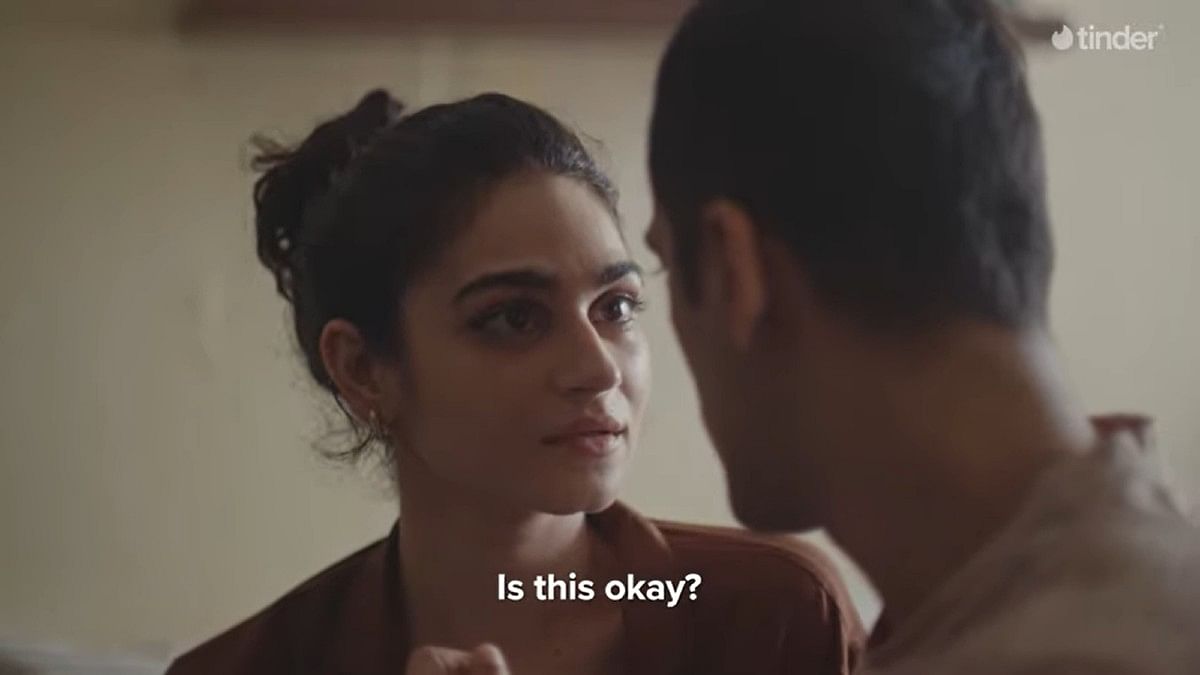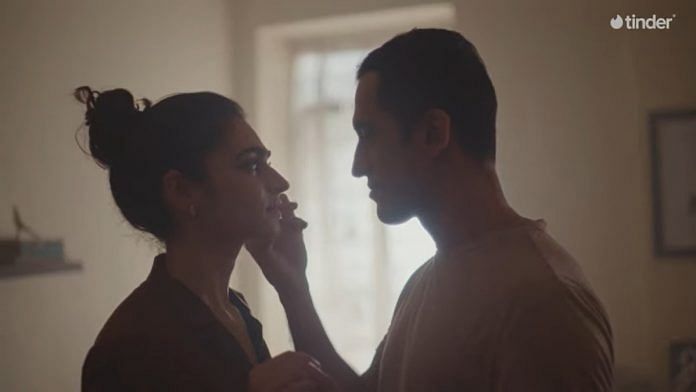New Delhi: “That night… I didn’t wanna do it,” Ria says to her ex-boyfriend Ved, who responds, “But, you didn’t say no.”
“But I didn’t say yes… And I wish once you’d just asked.”
This conversation about sex in a new short film is Tinder’s latest attempt to underline the importance of consent.
Released Thursday, the film called ‘Closure’ opens with the question of consent, then flashes back to some of the couple’s good memories while hinting at a night things go wrong. Ria is distraught by the memory — when there was lack of clear consent between the two before getting intimate — and shows signs of mental trauma. A year has passed since and the above conversation ensues when Ria confronts Ved about it.
For Tinder, the campaign is an ongoing effort as the app dominates India’s dating market. According to analytics provider Sensor Tower, as of September 2021, Tinder was the top grossing lifestyle app on the Google Play Store in India.
In August, the California-based company released a global report, ‘The Future of Dating Is Fluid‘, in which it said 2020 was its busiest year ever. The app was launched in 2012 in the US, and entered the Indian market in 2016.
The report had data from January 2020 to February 2021. As many as 2,000 singles were surveyed in India between September and November 2020, and about 5,000 Tinder users were surveyed between 6-12 May and 14-24 August the same year in the US.
According to the report, Tinder saw users check out 11 per cent more profiles of potential suitors and 42 per cent more matches per member in the pandemic year. It also noted that 19 per cent more messages were sent per day in February 2021 than in February 2020.
The pandemic made users yearn for more human connection, the report notes, adding, “60% of members came to Tinder because they felt lonely and wanted to connect with people”.
Also read: Feminist men have more sex — new study
When dates turn into crimes
These high volumes have only made Tinder stress more on consent.
Incidents such as the one elaborated in Closure are likely to be more frequent for Tinder couples given its popularity; data by analytics firm Statista shows that as of 2018, Tinder was the most used dating app in India.
Last year, there were two reported incidents of rape and extortion linked to Tinder dates.
One was in Pune, where an air hostess had allegedly been raped by her date, according to a December 2020 India Today report.
Earlier in November, Mumbai Mirror reported that a man had filed a case alleging his date, along with accomplices, extorted money and jewellery worth Rs 9 lakh.
While there is no public data on how many Tinder users are there in India, the company says the app is most used in Pune, according to a 2019 NDTV report. Worldwide, over 50 per cent of the app’s users are aged between 18 and 25 years, according to Tinder.
“We are on a mission to build a respectful member ecosystem, on and off the app. As a platform that is built on mutual consent, we understand the imminence of an enthusiastic ‘yes’ in relationships and intend to be a strong ally in promoting the need to have an open, honest and compassionate conversation,” said Taru Kapoor, general manager, Tinder & Match Group in India, in a press note released Thursday.
Also read: Woman’s consent can’t be implied from past experience with rape accused, says Delhi court
What consent looks like
In the note to the media, Tinder also said it produced Closure as an “extension to Tinder’s ongoing initiative coupled with a resources center www.letstalkconsent.com to encourage discourse on consent”. The film is also produced by Jugaad Motion Pictures, and is directed by Ria Singh.
Letstalkconsent.com focuses on understanding consent, giving users a comprehensive outlook on the different scenarios they might find themselves in, and what are the ways in which a healthy and safe intimate encounter can be had.
“Consent is pretty simple, really. It just means getting permission for any intimate activity. Sometimes consent is expressed with words, sometimes with actions…If you aren’t absolutely sure what they’re comfortable with, just ask,” it says.
It adds: “Erections or other signs of arousal might seem pretty obvious but DO NOT count as consent, since they’re involuntary.”

It also has easy-to-read bullet points, in which it highlights that sex with a girl under 18 (a minor) is considered “statutory rape under law”, even if consent is explicitly given.
In a section explaining how to give consent, Tinder explains: “If you’re not sure about whether the other person is enthusiastic about a particular sexual activity, ask them. Remember, the lack of ‘no’ is not a ‘yes’.”
In addition, the website encourages readers to look for the presence of “enthusiastic consent” before initiating sexual activity.
Seeking enthusiastic consent involves asking for regular verbal consent. For example, “Asking if a new sexual act is okay before proceeding”, and “Being vocal when you like something your partner is doing”.
Letstalkconsent.com was launched on 31 August this year by Nikhil Taneja, cofounder and CEO of Yuvaa, a Mumbai-based content production company focused on the youth.
Taneja had tweeted it had partnered with Tinder India to author a one-stop resource pool on consent, in association with Pink Legal, a website dedicated to laws governing women’s rights.
(Edited by Manasa Mohan)
Also read: Hey #MeToo activists, there’s a lot you don’t know about sex and assault in India



